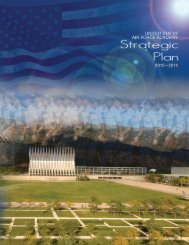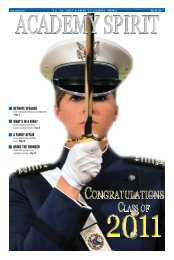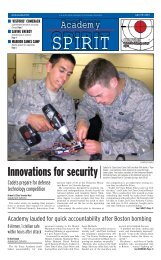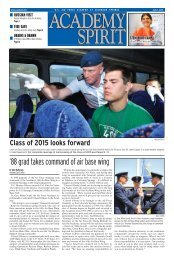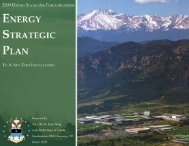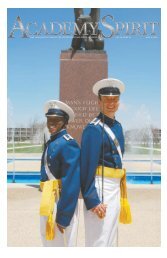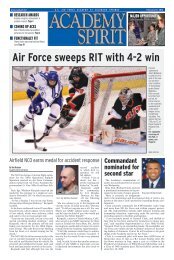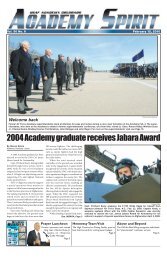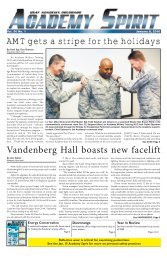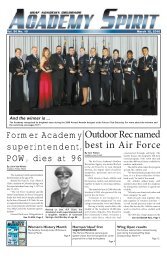2008-2009 Catalog - United States Air Force Academy
2008-2009 Catalog - United States Air Force Academy
2008-2009 Catalog - United States Air Force Academy
Create successful ePaper yourself
Turn your PDF publications into a flip-book with our unique Google optimized e-Paper software.
Suggested Course Sequence<br />
3rd-Class Year 2nd-Class Year 1st-Class Year<br />
Chem 200 <strong>Academy</strong>/BasSci Opt Astro Engr 410<br />
Civ Engr 330 Aero Engr 315 Civ Engr 351 (Summer)<br />
Civ Engr 362 Beh Sci 310 Civ Engr 369<br />
Econ 201 Biology 315 Civ Engr 463<br />
English 211 Civ Engr 361 Civ Engr 467<br />
Engr Mech 220 Civ Engr 368 Civ Engr 468<br />
Law 220 Civ Engr 390 Civ Engr 469<br />
Math 243 El Engr 231 Civ Engr 480<br />
Math 245 Engineering Opt English 411<br />
MSS 200 History 302 MSS 400<br />
Physics 215 Math 356 Philos 310<br />
Pol Sci 211 Sys Opt Engr 311 Soc Sci 412<br />
ENVIRONMENTAL ENGINEERING (Civ Engr)<br />
Offered by the Department of Civil and Environmental Engineering.<br />
Civ Engr 330. Elementary Structural Analysis. Static analysis of determinate structures: stresses and deformations in<br />
beams, trusses, and frames.<br />
Civ Engr 351. Civil Engineering Practices - Field Engineering. This two-phase course includes Operation Civil<br />
Engineering <strong>Air</strong> <strong>Force</strong> (OpsCEAF) and a three-week field experience at the <strong>Academy</strong> Field Engineering and Readiness<br />
Laboratory (FERL). Second-class cadets spend first period at a government facility working on a project in the civil engineering<br />
field. Participants will be scheduled for a second or third period summer leadership program. The three-week field experience<br />
introduces surveying, construction materials, design of concrete mixes, and hands-on construction using metal, timber, asphalt<br />
and concrete and working knowledge of environmental systems. Students will construct various projects that they will design<br />
in later civil and environmental engineering courses. OpsCEAF is in lieu of Operation <strong>Air</strong> <strong>Force</strong> (Mil Tng 301).<br />
Civ Engr 361. Fundamental Hydraulics. Application of the principles of incompressible fluid mechanics. Topics include:<br />
fluid properties, manometry, forces on submerged bodies, open channel flow, and conduit flow. Impulse momentum, energy<br />
methods, Hardy-Cross method for balancing flows in distribution systems and sewer design are also covered.<br />
Civ Engr 362. Introduction to Environmental Engineering. Fundamental theory, principles and preliminary design of<br />
unit operations in environmental engineering. Topics include air and water pollution, municipal and hazardous waste treatment,<br />
water chemistry, microbiology, mass balance, reactor theory and kinetics, and physical process theory.<br />
Civ Engr 368. Ground and Surface Water Hydrology and Contaminant Transport. Comprehensive introduction to<br />
groundwater and surface water hydrology. Contaminant transport of hazardous chemicals in groundwater is also covered.<br />
Topics include: hazardous chemicals, environmental regulations, groundwater flow, well hydraulics, transport of contaminants<br />
in the subsurface environment, hydrologic cycle, surface water hydrology, hydrographs, rational method for storm water runoff,<br />
and storm water collection system design.<br />
Civ Engr 369. Introduction to <strong>Air</strong> Pollution. In-depth introduction into air pollution covering such topics as the causes,<br />
sources and effects of air pollution. Topics include: legislative standards (ambient and source) for pollutants, regional and<br />
global air pollution issues, environmental health, indoor air pollution, noise, air pollution instrumentation and gas flow<br />
measurements, basic meteorology, and dispersion modeling. The course work involves several laboratory exercises.<br />
Civ Engr 390. Introduction to Soil Mechanics. Engineering properties of soils, soil classification, permeability,<br />
consolidation, compaction and shear strength and applications to engineering design. Soils laboratories and reports.<br />
Civ Engr 405. Civil Engineering Seminar. Designed to give civil engineering majors the opportunity to synthesize and<br />
apply the concepts they have learned throughout their undergraduate education. Topics discussed include engineering ethics<br />
and those that cadets may encounter in the <strong>Air</strong> <strong>Force</strong> after graduation.<br />
Civ Engr 463. Wastewater Treatment Plant Design. Design of facilities for physical, chemical, and biological treatment<br />
of wastewater, and treatment and disposal of sludge. Coverage of advanced wastewater treatment and land treatment systems.<br />
Laboratory exercises analyzing raw sewage with data being used for the design processes.<br />
<strong>United</strong> <strong>States</strong> <strong>Air</strong> <strong>Force</strong> <strong>Academy</strong> <strong>Catalog</strong> 95



